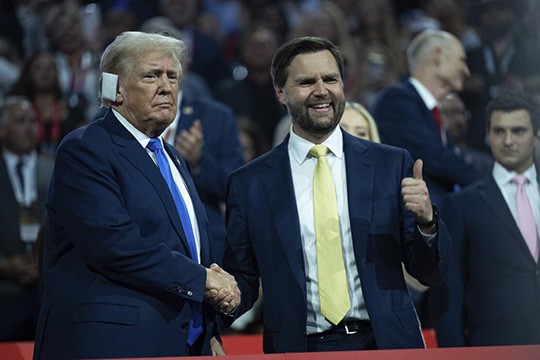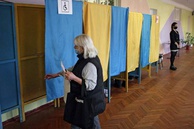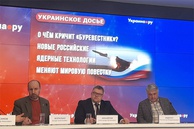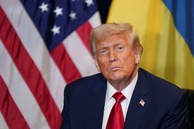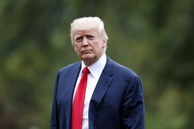Focusing attention on the personality of US vice-presidential candidate J.D. Vance has created an additional negative background for Kyiv. The appointment of the Republican Senator from Ohio as Donald Trump’s running mate in the wake of the attempted assassination of America’s former president seriously added to the general mood of alarm and despondency reigning in the Ukrainian capital. Symptomatically, one Ukrainian media outlet called Vance “The Guy from the American Donbass.” A brief summary of Vance’s biography is replete with gloomy expectations: “Vance generally stands out from the lineup of American elitists - he comes from the lower social classes (his mother was a drug addict, his father abandoned them, and Vance was raised by his grandparents). He also comes from a disadvantaged region - the so-called “rust belt,” as the economically declining industrial cities of the Midwest are called in the United States, even though they once were the industrial heart of the United States - the American Donbass, the center of the country’s metallurgy and heavy industry.” [i] What good can Ukraine expect from a native of the “American Donbass”? Well, here are some of the conclusions one can draw from the statements he has made against continued US support for Ukraine:
- In 2023, Vance, along with 18 other Republicans, signed an appeal to Biden urging him to end “unlimited aid” to Ukraine. He also threatened to block the next aid packages if they were not coupled with Washington’s strategy of a speedy completion of the Russian-Ukrainian war.
Ahead of Vladimir Zelensky’s December 2023 visit to Washington, Vance demanded that the White House admit that Ukraine would eventually have to cede part of its territories to Russia: “We have a food crisis... We have an energy crisis... What’s in America’s best interest is to accept Ukraine is going to have to cede some territory to the Russians and we need to bring this war to a close,” Vance told CNN.
- Senator Vance voted against the latest aid package for Kyiv in April.
- Also in April, Vance called for making military and other assistance to Ukraine conditional on ending Kyiv’s pressure on the Ukrainian Orthodox Church. He harshly criticized a parliamentary bill aimed at banning the UOC: “You cannot deprive an entire religious community of religious freedom because some of its adherents disagree with you about the current conflict. We should be ashamed of our refusal to use the billions of dollars we send to Ukraine as leverage to secure and guarantee real religious freedom.”
- In 2022, Vance said, “I have to be honest with you; I don’t care what happens to Ukraine one way or another.”
- During the Munich Security Conference in February 2024, Vance said that the United States needed to reconsider its support for Kyiv, and ignored the Ukrainian delegation’s meeting with US Senators.
- Vance has repeatedly advocated for a neutral status for Ukraine and doesn’t believe that Ukraine will be able to regain its territories.
- “Ukraine’s challenge is not the GOP; it’s math. Ukraine needs more soldiers than it can field even with draconian conscription policies. And it needs more materiel than the United States can provide."
- Vance argued that Ukraine will have to accept the “harsh reality,” adopt a defensive strategy and negotiate with Russia as soon as possible: “But this would require both the American and Ukrainian leadership to accept that Mr. Zelensky’s stated goal for the war — a return to 1991 boundaries — is fantastical.” [ii]
Ukraine's reaction to Vance's possible appointment is similar to the reaction of Europeans, who see Europe as the European Union. Some hopes are harbored by Ukrainian MPs. This is what they told Politico: [iii]
- Alexander Merezhko, head of the Verkhovna Rada’s international relations committee: “His views may change on international issues.” The fact that Vance has evolved from a fierce critic of Trump into a strong supporter means he can be persuasive on other issues, including aid to Ukraine.”
- Egor Cherniev, Deputy Chair the Ukrainian parliament’s Committee on National Security, Defense and Intelligence: “It is difficult for us to imagine that once he is in the White House, James Vance will start acting against American interests. And the strategic interests of the United States today lie in containing Russia in Europe.”
This means that in Kyiv they hope that Vance will “come to his senses” and the United States will continue the policies of the Biden administration.
Meanwhile, in Europe they fear that J.D. Vance’s nomination as a vice-presidential candidate could mean a “catastrophe for Ukraine.” [iv] This is the impression that European bureaucrats get from the speech that Vance’ gave at the Munich Security Conference: “J.D. Vance already promised to deprioritize the European track in US politics. He advocates early negotiations with Russia on the division of Ukraine. After all, the American industry is simply unable to handle a conflict of such intensity. The US military-industrial complex produces less than 400,000 artillery shells a year and only 300-500 missiles for Patriot.” [v] Vance believes that the US arsenals are depleted, while the confrontation with Russia is only adding strength to China’s position, so we need to concentrate on competition with China before the US loses a new Cold War.
It can’t be ruled out, however, that Vance will be schooled in “party policy.” Besides, he is from the “American Donbass,” and the factories, American factories, should work and for this purpose. Europeans, and not only Europeans, must buy US-made weapons. And to buy these weapons they must believe in the threat and be scared. Now they believe in the “Russian threat.” This means that this is the “right situation.” In this monetary and industrial sense, for the West the Ukrainian crisis is the “correct” story. Just like the Israeli crisis. Therefore, if the Trump administration becomes a reality, then, first, the inertia of the processes launched by the Democrats will linger on, and second, there will be a certain correction of the political component of the crises at the level of rhetoric and a reduction in the intensity of the confrontation, but no more. Possibly, there could be some hush-hush talk about the economic efforts of Trump and his son-in-law Jared Kushner (who will play a smaller role in the administration than during the previous term) in the framework of the Israeli crisis, since the development interests of Ivanka Trump’s husband extend to the Gaza Strip and also to Saudi Arabia.
It will be interesting to watch how the Trump administration's European policy will be structured at different levels and through different channels. Here again we have in mind Kushner, whose investment firm Affinity Partners (aka Atlantic Incubations LLC) has already taken a 99-year lease on destroyed properties in central Belgrade, including the former headquarters of the Yugoslav army, to build luxury apartments in their place. [vi] Belgrade’s reaction to this has been ambiguous though. Therefore, they plan to build a memorial complex, which will be financed by investors, but will belong to the Republic of Serbia, which will manage and upkeep the complex. The project has been worked on since 2013, and this is how Politico sees the deal’s political implications: “Trump’s anti-establishment stances and his embrace of autocrats align well with Serbian President Aleksandar Vučić, who recently organized a grandiose welcome for Chinese President Xi Jinping and refuses to participate in sanctions against Russia. Critics suspect that leveraging deals with his son-in-law might be a way to pay forward for potential favors in the event of a second Trump administration.” [vii]
Igor Novakovic, an analyst with the Serbian foreign policy think tank Foundation Center for International Relations and Security (ISAC), has a very critical view of the pragmatic nature of this project: “If the government expects to use this project as a means to mending fences with Washington, then there may be some kind of perverted political symbolism in this , when the demolition of this particular building opens a new era in US-Serbia relations that leave the past behind us.”
Also involved in the project is Richard Grenell, who served as US ambassador to Germany and envoy to Serbia and Kosovo under Trump, and may be tapped as America’s next Secretary of State. Add to this Trump’s contacts with Hungarian Prime Minister Viktor Orban, where Grenell, spotted in the Balkans even after Trump left the White House, could also play a role. The whole situation starts looking like something systemic: the former and, possibly, future US president is strengthening ties with the outcasts of the European Union, who, standing up for their countries’ interests, come into conflict with Brussels, i.e. the EU and NATO. Therefore, we can expect the implementation of Kushner’s projects in Hungary, or something along the same lines.
To better understand the broad outlines of Trump's foreign policy if he returns to the White House let's move to the Middle East. When Trump was president, Kushner's focus in the Middle East was to resolve "historic disputes that included efforts to improve relations between Israel and the United Arab Emirates, Bahrain and Morocco, known as the Trump Peace Plan or the Abraham Accords."
Summing up the current situation in the Middle East, Trump’s pick as his second-in-command reiterated his father-in-law’s call for Israel to "finish the job" against Hamas in the Gaza Strip, and declared that ties between Israel and Saudi Arabia can only be established after Hamas is defeated. Saudi Arabia, for its part, has said it cannot establish ties with Israel until it sees a viable path to the creation of a Palestinian state. [viii]
Both the Balkan and Middle East tracks included financial incentives offered by the US government for signing agreements, including loans to the private sector administered by the newly created US International Development Finance Corporation (DFC). During Trump's presidency, DFC was headed by Adam Boehler, Kushner's former college roommate. In 2020, Boehler held a press conference in Belgrade with Serbian President Aleksandar Vučić to announce the opening of the DFC’s office in the city.
This set the stage for future foreign policy steps during Trump’s presidency, and this policy is very likely to continue since the problems that Trump’s representatives tried to resolve during the Biden administration have only worsened with contradictions in the EU increased and the Israeli crisis blazing on.
That being said, the main question is Trump’s policy regarding the Ukrainian crisis, whether the mechanisms and principles of the Balkan and Middle Eastern cases could be applied in Ukraine and how.
Let's do some guesswork. Some European officials have already stated that Trump’s return to the White House will spell a disaster for Ukraine. Instead, this may prove a salvation. Blinded by the Biden administration’s policies, Ukrainian politicians are in a state of shock dreading Trump's victory in November and the fact that Vance, who has spoken much more substantively about Ukraine than his current boss, will become vice president. In the current situation, Kyiv should take a closer look not at Vance, but at Kushner’s legacy and possible plans in the Balkans and the Middle East, try to break the impasse of “war until victory over Russia with Western support,” and make sure that Kushner’s peacekeeping, financial and development plans are implemented also in Ukraine.
The Ukrainian crisis is Biden's war; it is a corrupt skeleton in the Bidens' closet. This is how Trump sees the situation now at hand. One has to admit, however, that many people in the Republican camp support an armed confrontation with Russia, and Trump’s opponents are all set to make the Ukrainian crisis Trump’s war too. But true to his style, Trump will lose no time shifting all the burdens of the Ukrainian crisis to Europe, preserving US interests there, considering the Old World as a consumer of the products churned out by America’s military-industrial complex and the US industry as a whole, other industrial products, and squeezing Chinese goods out of the European market. This could translate into earlier demands for ramping up Europe’s defense capability and increasing NATO members’ contribution to the common Euro-Atlantic budget.
What Kyiv does not understand now, in anticipation of the Trump presidency, is how they can get out of the political conflict - the reckless commitment of the Biden administration. What is absolutely clear in Moscow is that Trump will not be a friend of Russia. Indeed, with him in the White House, the policy of anti-Russian sanctions started by Democratic President Barack Obama continued. Regarding the Ukrainian crisis, Trump did not contribute in any way to the implementation of the Minsk accords. However, in the person of Jared Kushner, the previous Trump administration, even though it did not overcome the inertia of Obama’s “controlled chaos,” followed the path of reconciliation and commercialization of foreign policy relations. This gives some hope for easing the intensity of the confrontation in the blazing Ukrainian and Israeli crises.
The views of the author are his own and may not necessarily reflect the position of the Editorial Board.
---------------------------------------------------------------------------
[i] https://t.me/stranaua/162191
[ii] https://ctrana.one/news/468698-itohi-874-dnja-vojny-v-ukraine.html
[iii] https://www.politico.com/news/2024/07/16/u-s-allies-grapple-with-j-d-vance-00168850
[iv] https://tass.ru/mezhdunarodnaya-panorama/21370047
[v] https://t.me/malekdudakov/7293
[vi] https://www.politico.eu/article/trump-tower-belgrade-serbia-jared-kushner-donald-trump-richard-grenell-yugoslav-army-headquarters-building-kosovo-balkans/
[vii] https://www.politico.eu/article/donald-trump-son-in-law-jared-kushner-secure-controversial-belgrade-real-estate-deal-serbia/
[viii] https://thehill.com/policy/international/4773538-jd-vance-foreign-policy/
read more in our Telegram-channel https://t.me/The_International_Affairs

 12:25 24.07.2024 •
12:25 24.07.2024 •
